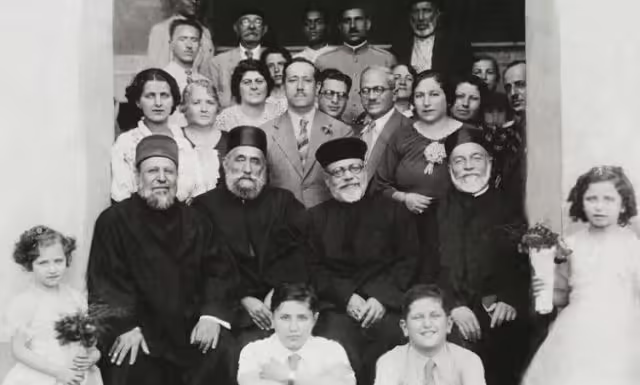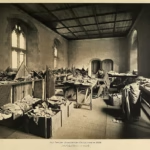Throughout Egypt’s history, various communities have left their mark on its economy, culture, and society. Among them, prominent Jewish families played a significant role, especially from the late 18th to the early 20th centuries. This article explores the legacy of five influential Jewish families—the Qattawi, Suarès, Rolo, Menasce, and Mosseri families—whose economic initiatives and social contributions profoundly shaped Egypt’s financial, real estate, and hospitality sectors.
The Qattawi Family: Pioneers in Egyptian Finance and Industry
Early History and Government Roles
The Qattawi family rose to prominence in late 18th-century Egypt, beginning with Elishah Haidar Qattawi’s relocation to Cairo. His son, Yaqub Qattawi (1801–1883), became a pivotal figure, establishing himself as the first Egyptian Jew to receive the title “Bey.” Known for his adept financial skills, Yaqub was entrusted with government concessions for trade and finance, eventually serving as treasurer during the reign of Khedive Abbas I. His influence in the Egyptian government continued under subsequent rulers, solidifying the family’s status. In addition to his local titles, Yaqub was honored as a “Baron” by the Austro-Hungarian Empire, a testament to his widespread influence.
Economic Contributions and Legacy
Following Yaqub’s death in 1883, his son Musa Qattawi (1850–1924) carried on the family’s legacy. Musa became a member of the Egyptian Parliament and was granted the title “Pasha.” Under his leadership, the Qattawi family became heavily involved in Egypt’s infrastructure and industry. They were instrumental in constructing the Sha’ar Hashamayim Synagogue on Adly Street in 1899, a landmark for Cairo’s Jewish community. In 1903, the family contributed to establishing the Cairo Stock Exchange, marking a significant milestone in Egypt’s financial sector. Expanding their interests, the Qattawi family ventured into sugar and rice milling and founded the Salt and Soda Company in 1906, showcasing their commitment to industrial growth in Egypt.
The Suarès Family: Real Estate, Banking, and Infrastructure Visionaries
Origins and Early Ventures
The Suarès family, of Sephardic origin, arrived in Egypt from Livorno, Italy, in the first half of the 19th century. Known for their business acumen, the three Suarès brothers—Raphael, Joseph, and Felix—founded the Suarès Company in 1875. Raphael Suarès later collaborated with notable figures such as Rolo and Qattawi, securing partnerships with French capital to establish the Egyptian Real Estate Bank in 1880 and the National Bank of Egypt in 1898. These ventures laid the foundation for Egypt’s banking industry, positioning the Suarès family as essential contributors to the nation’s economic growth.
Major Projects and Investments
Beyond banking, the Suarès family was involved in groundbreaking infrastructure projects that transformed Egypt. They played a role in the construction of the Aswan Dam and purchased large tracts of land, which they resold to prominent landowners and real estate companies. In 1897, they founded the Egyptian General Company for Sugar and Refining, followed by the Wadi Kom Ombo Company in partnership with the Qattawi and Rolo families. These ventures cemented the Suarès family’s role in Egypt’s agricultural and industrial sectors, contributing to the growth of sugar production and land development.
Collaboration and Impact on Urban Development
The Suarès family collaborated closely with the Qattawi family in the development of railways, further enhancing Egypt’s transportation infrastructure. Their contributions to urban development extended to the creation of Suarès Square in Cairo, a significant landmark named after Felix Suarès. However, in 1939, this square was renamed Mustafa Kamel Square. Despite this change, the family’s influence in urban planning and real estate remains a notable aspect of Cairo’s history.
The Rolo Family: Financial Innovators and Community Leaders
Early Economic Influence and British Ties
The Rolo family, a Sephardic Jewish family holding British citizenship, migrated to Egypt in the first half of the 19th century. Rubin Rolo established a profitable business in dye importation, and in 1870, his sons Jacob and Simon Rolo, along with partners, founded the financial and commercial firm Rubin Rolo & Sons. The Rolo family’s early success in trade set the stage for further ventures, as they became known for their financial expertise and collaborative spirit.
Collaborations and Community Contributions
As partners in various ventures with the Qattawi and Suarès families, the Rolo family played an integral role in Egypt’s banking industry, participating in the founding of both the Egyptian Real Estate Bank and the National Bank of Egypt. Beyond finance, Robert Jacob Rolo became a prominent community figure, leading Alexandria’s Jewish community from 1934 to 1948. Known for his anti-Zionist stance, he engaged in Egypt’s social and economic life, serving as a legal advisor to King Fuad I and receiving the title of “Sir” in 1938, marking a prestigious recognition of his contributions.
The Menace Family: From Finance to Cotton and Sugar Trade
Early Beginnings and Financial Acumen
The Menasce family, hailing from Spain, arrived in Egypt in the 18th century and began building their fortune in the Jewish quarter as money changers. Jacob de Menasce (1807-1887), renowned for his financial prowess, earned the title “money changer Pasha” and served under Khedive Ismail. He co-founded the financial firm Menasce & Sons, which expanded internationally with branches in major European cities.
Expansion into Trade and Agriculture
Jacob de Menasce’s family further expanded their business into the cotton and sugar trades, key industries in Egypt at the time. The Menasce family’s ventures in these fields strengthened Egypt’s economy and solidified their own reputation as leaders in commerce. Additionally, Felix Yehuda Menasce held a prominent position in Alexandria’s Jewish community from 1926 to 1933, symbolizing the family’s continued influence on both economic and social fronts.
The Mosseri Family: Hospitality and Cinematic Innovations
Initial Ventures and Financial Success
The Mosseri family, of Italian Sephardic origin, established their foothold in Egypt’s trade sector, eventually founding the Joseph Nasim Mosseri & Sons company. Joseph Nasim Mosseri’s business acumen laid the foundation for his family’s future success, especially in hospitality and finance.
Contributions to Egypt’s Hospitality Sector
With ventures like the Grand Hotels of Egypt Company, the Mosseri family significantly influenced Egypt’s burgeoning hospitality industry, establishing landmark hotels like Continental, Mena House, Savoy, and San Stefano. This foray into hospitality made the Mosseri name synonymous with luxury and innovation in Egypt.
Innovations in Agriculture
An agricultural engineer by training, Victor Mosseri contributed to developing Egypt’s cotton and sugar industries. His expertise in agrarian engineering led to advancements in cultivation practices, further elevating Egypt’s standing as a center for agricultural exports.
Final Thoughts on the Legacy of Jewish Families in Egypt
These prominent Jewish families—the Qattawi, Suarès, Rolo, Menasce, and Mosseri—left an indelible mark on Egypt’s economic and cultural heritage. Their contributions to banking, industry, real estate, and hospitality have shaped Egypt’s modern development. Even after their prominence faded, the institutions they helped build and the industries they advanced continued to play vital roles in Egypt’s economy, reflecting a rich history of collaboration and multicultural influence.
Conclusion
The legacy of these families is a testament to the power of collaboration and innovation. By driving progress in fields like finance, agriculture, hospitality, and more, they wove their influence into the fabric of Egyptian society. Their stories underscore the impact of diverse communities working together to build a brighter future.




